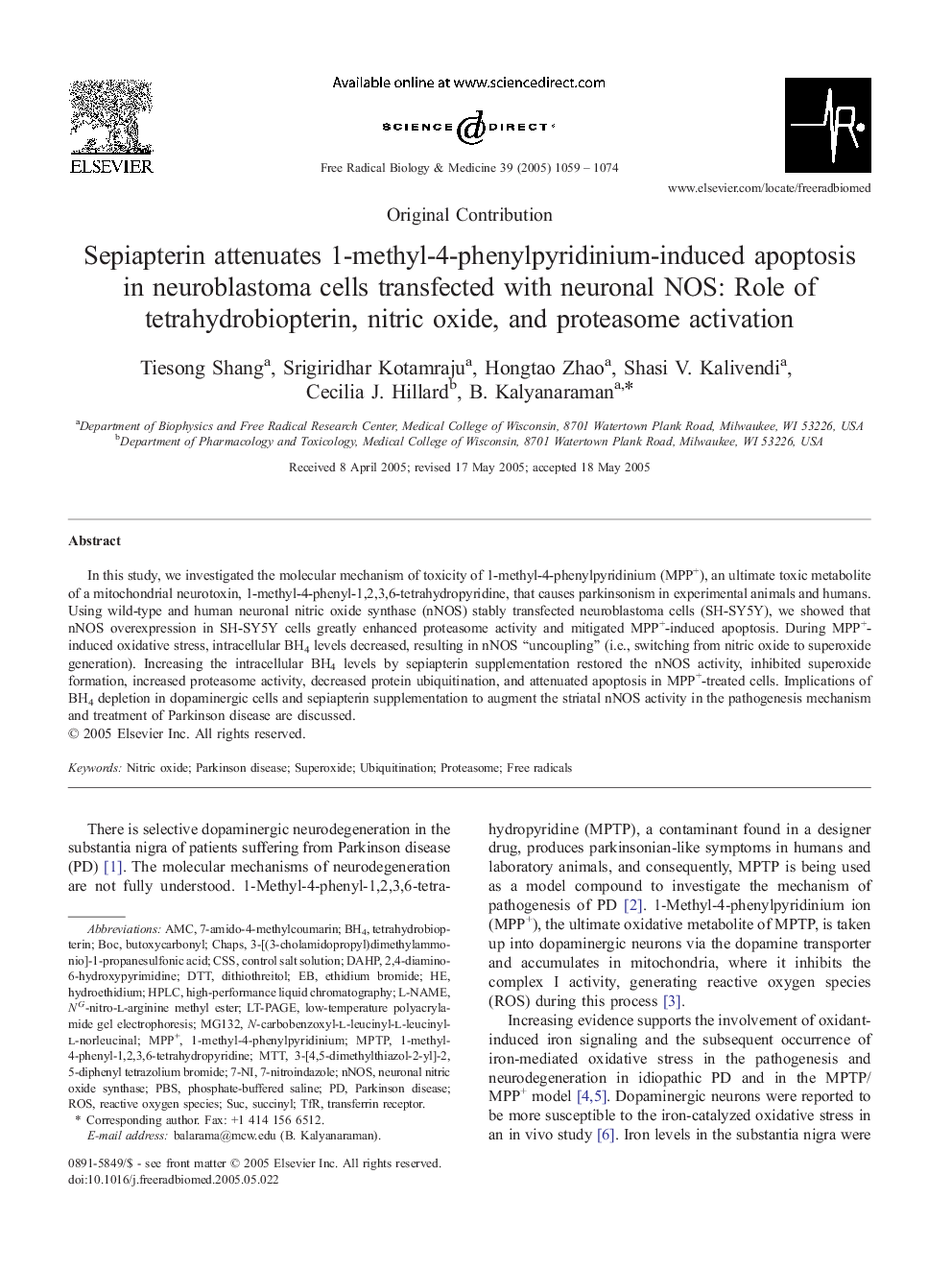| کد مقاله | کد نشریه | سال انتشار | مقاله انگلیسی | نسخه تمام متن |
|---|---|---|---|---|
| 10738961 | 1046849 | 2005 | 16 صفحه PDF | دانلود رایگان |
عنوان انگلیسی مقاله ISI
Sepiapterin attenuates 1-methyl-4-phenylpyridinium-induced apoptosis in neuroblastoma cells transfected with neuronal NOS: Role of tetrahydrobiopterin, nitric oxide, and proteasome activation
دانلود مقاله + سفارش ترجمه
دانلود مقاله ISI انگلیسی
رایگان برای ایرانیان
کلمات کلیدی
DTTDAHPMG132NG-nitro-l-arginine methyl esterBOCtetrahydrobiopterinBH4AmCCSS2,4-diamino-6-hydroxypyrimidine - 2،4-دیامینو-6-هیدروکسی پوریمیدین3-[(3-cholamidopropyl)dimethylammonio]-1-propanesulfonic acid - 3- [(3-کلامیدوپروپیل) دی متیل آمونیو] -1-پروپان سولفونیک اسید7-amido-4-methylcoumarin - 7-آمید-4-متیل کومارینl-NAME - L-NAMEethidium bromide - اتیدیوم برومایدbutoxycarbonyl - بوتاکس کربنیلdithiothreitol - دیتیوتریتولCHAPS - چاپسhigh-performance liquid chromatography - کروماتوگرافی مایعی کاراHPLC - کروماتوگرافی مایعی کارا
موضوعات مرتبط
علوم زیستی و بیوفناوری
بیوشیمی، ژنتیک و زیست شناسی مولکولی
سالمندی
پیش نمایش صفحه اول مقاله

چکیده انگلیسی
In this study, we investigated the molecular mechanism of toxicity of 1-methyl-4-phenylpyridinium (MPP+), an ultimate toxic metabolite of a mitochondrial neurotoxin, 1-methyl-4-phenyl-1,2,3,6-tetrahydropyridine, that causes parkinsonism in experimental animals and humans. Using wild-type and human neuronal nitric oxide synthase (nNOS) stably transfected neuroblastoma cells (SH-SY5Y), we showed that nNOS overexpression in SH-SY5Y cells greatly enhanced proteasome activity and mitigated MPP+-induced apoptosis. During MPP+-induced oxidative stress, intracellular BH4 levels decreased, resulting in nNOS “uncoupling” (i.e., switching from nitric oxide to superoxide generation). Increasing the intracellular BH4 levels by sepiapterin supplementation restored the nNOS activity, inhibited superoxide formation, increased proteasome activity, decreased protein ubiquitination, and attenuated apoptosis in MPP+-treated cells. Implications of BH4 depletion in dopaminergic cells and sepiapterin supplementation to augment the striatal nNOS activity in the pathogenesis mechanism and treatment of Parkinson disease are discussed.
ناشر
Database: Elsevier - ScienceDirect (ساینس دایرکت)
Journal: Free Radical Biology and Medicine - Volume 39, Issue 8, 15 October 2005, Pages 1059-1074
Journal: Free Radical Biology and Medicine - Volume 39, Issue 8, 15 October 2005, Pages 1059-1074
نویسندگان
Tiesong Shang, Srigiridhar Kotamraju, Hongtao Zhao, Shasi V. Kalivendi, Cecilia J. Hillard, B. Kalyanaraman,